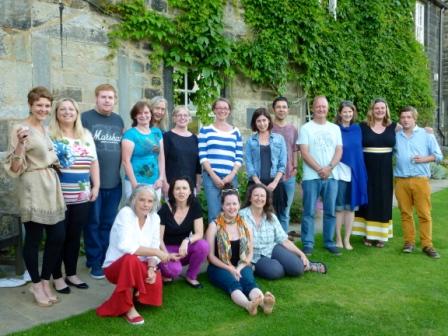Most writers I know would regard that title as a complete oxymoron. They would greet the word ‘synopsis’ with a moan or at least a frown. I absolutely understand that – for me it was fear.
I didn’t know what to do. So I did what I usually do and bought lots of how-to books. There are a good half dozen on my study shelves. (I would heartily recommend Nicola Morgan’s Write to be Published and the e-book by the way). But they didn’t stop the fear.
I wondered why synopses gave me the jitters – and came up with two main reasons;
- that writing down what actually occurred in my story pinned it down. It could be that thing and no other. I liked wandering the wide open tundra of different possibilities.
- that it put me on the spot. It made me declare what was going on in the story – and I could be wrong.
Now, on my last Arvon sojourn ( a wonderful Retreat at Lumb Bank with Steve Voake, N. M. Browne and a slew of talented fellow children’s authors) I was grilled.
N. M. Browne by her own admission is the Queen of Awkward Questions. It’s not always comfortable to be interrogated about your story by someone so intelligent and incisive – but it is good. There was no point in me resisting – it was so worthwhile to be made to think harder about my ropey first draft.
I see writing a synopsis as akin to that salutary process.
Options are for first drafts – wander all over that prairie of ideas when you’re creating by all means – but when it comes to editing, the synopsis is your friend.
I use YWriter5. It’s a no-frills way of organising your work created by a writer. One salient feature is the use of chapter descriptions and scene summaries. You don’t have to fill them in, of course – but if you do, they create a synopsis for you.
The crucial point is the way it makes you look at your work – whichever way you tackle your synopsis. You have to focus and analyse:
- what is your intention for each scene?
- is it actually doing that?
If you can’t decide what you want each scene to do, how on earth can you get it across to the reader?
So I would say view the writing of your synopsis as a good thing. It makes you understand the anatomy of your story like nothing else. Dissections aren’t pretty – but just ask an artist how essential it is to know the form beneath.



